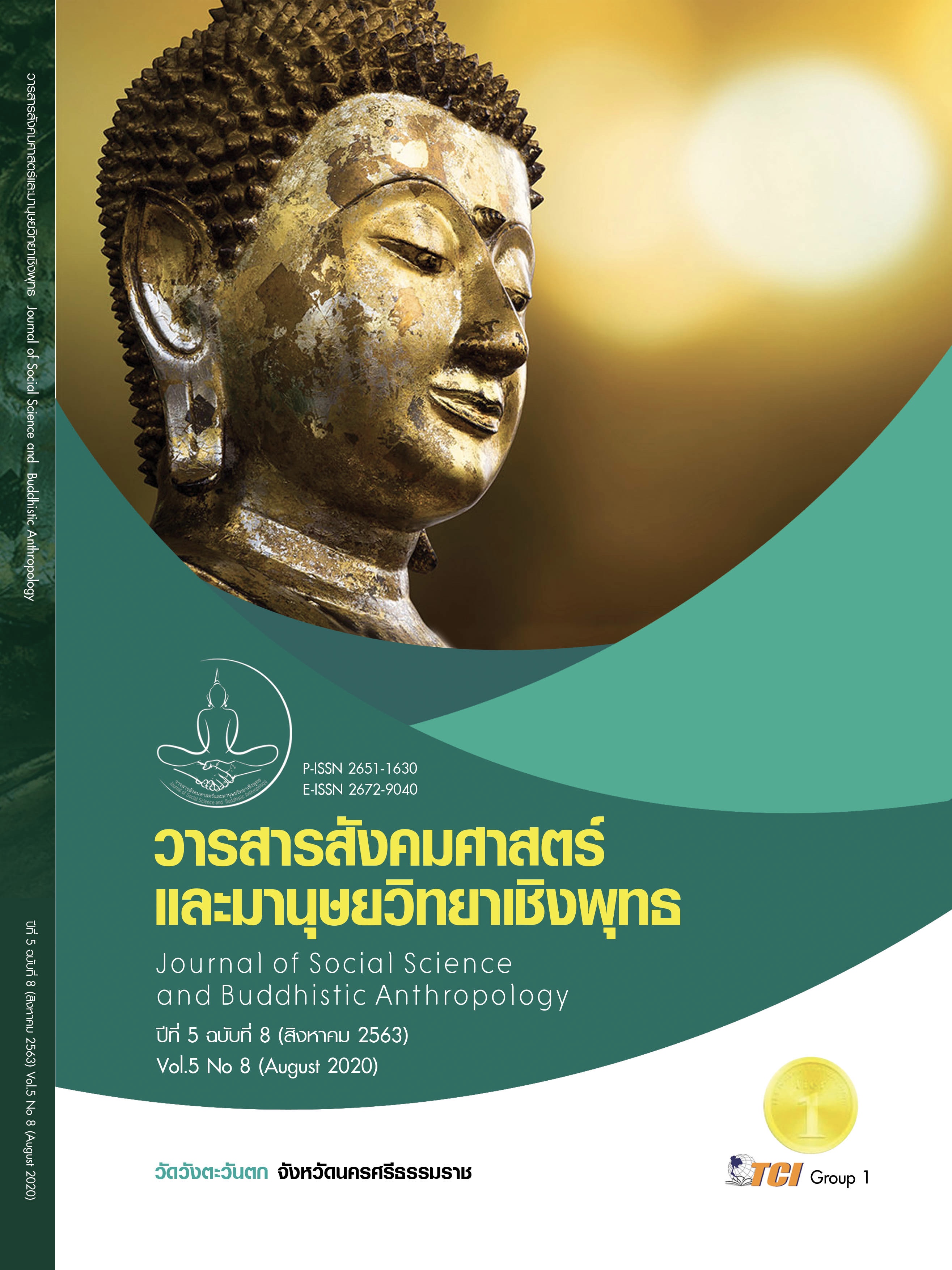THE IMPACT OF CASH FLOW AND AUDIT QUALITY AFFECTING PROFIT MANAGEMENT THROUGH ACCRUAL TRANSACTION OF LISTED COMPANIES IN THE STOCK EXCHANGE OF THAILAND
Keywords:
Case Flow, Audit Quality, Profit Management, Accrual Transaction, The Stock Exchange of ThailandAbstract
The purposive of this research were to study the impact of cash flow and the quality work affecting profit management through accrual transaction of listed companies on the Stock Exchange of Thailand was quantitative research. Using information from financial statements, annual report and annual registration statement (form 56-1) between 2014 and 2018. The sample group is 230 listed companies on the Stock Exchange of Thailand and using random sampling method based on proportion of industry type. Using descriptive statistics such as maximum, minimum, mean and standard deviation, and inferential statistics used for multiple regression analysis and techniques used to test the multiplicative conditions of variables including Pearson’s Correlation Coefficient, Tolerance and Variance Inflation Factor. The research found that ; the cash flow were operating activities, investment activities and financing activities had positive impact on the profit management through open items from business operations and accrual transaction at the discretion of the management of companies registered in the Stock Exchange of Thailand was at .01 statistical significance level. The quality of the audit is the size of the audit firm, examination fee and duration of service had positive impact on the profit management through accrual transaction from business operations and accrual items at the discretion of the management of companies listed on the Stock Exchange of Thailand was at .01statistical significance level. Therefore, once the business had been in operation for a while investors should check the results of operations on cash.
References
แก้วมณี อุทิรัมย์. (2556). ความสัมพันธ์ระหว่างอัตราส่วนทางการเงินกับผลตอบแทนที่คาดหมายของบริษัทที่จดทะเบียนในตลาดหลักทรัพย์แห่งประเทศไทย กรณีศึกษากลุ่มอุตสาหกรรมเทคโนโลยี. ใน เอกสารการประชุมวิชาการระดับชาติ ครั้งที่ 8 ประจำปี 2556. มหาวิทยาลัยศรีปทุม.
จินตนา โลหิตหาญ. (2560). ความสัมพันธ์ระหว่างกระแสเงินสดจากกิจกรรมจัดหาเงินกับผลการดำเนินงาน ความสามารถในการทำกำไร และมูลค่าหลักทรัพย์ตามราคาตลาดในอนาคตของบริษัทจดทะเบียนในตลาดหลักทรัพย์แห่งประเทศไทย. ใน วิทยานิพนธ์บัญชีมหาบัณฑิต สาขาการบัญชี. มหาวิทยาลัยศรีปทุม.
ชญานุช คลังวิเชียร. (2553). การวิเคราะห์คุณภาพกำไรของกลุ่มธุรกิจอุตสาหกรรมยานยนต์ในตลาดหลักทรัพย์แห่งประเทศไทย. ใน สารนิพนธ์บัญชีมหาบัณฑิต สาขาการบัญชี. มหาวิทยาลัยศรีปทุม.
ณัฐณิชา ฟูเฟื่องสมบัติ. (2559). คุณภาพงานสอบบัญชีและการตกแต่งกำไร. ใน สารนิพนธ์บัญชีมหาบัณฑิต สาขาวิชาการบัญชีธุรกิจแบบบูรณาการ. มหาวิทยาลัยธรรมศาสตร์.
ตลาดหลักทรัพย์แห่งประเทศไทย. (2558). ปัจจัยที่มีผลกระทบกับราคาหุ้น. เรียกใช้เมื่อ 10 เมษายน 2563 จาก https://www.set.or.th/education/th/begin/stock_content02.pdf
ทิพาภรณ์ เชียงทอง. (2554). ความคิดเห็นของนักบัญชีที่มีต่อการใช้ข้อมูลในงบกระแสเงินสดและสัญญาณเตือนภัยจากงบกระแสเงินสด. ใน สารนิพนธ์บริหารธุรกิจมหาบัณฑิต สาขาวิชาการบัญชี. มหาวิทยาลัยเทคโนโลยีราชมงคลธัญบุรี.
ประไพพิศ สวัสดิรัมย์. (2559). ปัจจัยที่มีอิทธิพลต่อคุณภาพกำไรของบริษัทจดทะเบียนในตลาดหลักทรัพย์แห่งประเทศไทย. วารสารวิชาการมหาวิทยาลัยฟาร์อีสเทอร์น, 10(1), 143-156.
พรทิวา ขาวสะอาด. (2555). ปัจจัยที่มีความสัมพันธ์กับระดับการจัดการกำไร: กรณีศึกษาบริษัทจดทะเบียนในตลาดหลักทรัพย์แห่งประเทศไทย. วารสารวิชาการศรีปทุม ชลบุรี, 9(2), 29-35.
มณฑา สุทธิพงค์. (2553). กำไรสุทธิ กระแสเงินสดจากการดำเนินงานและรายการคงค้างทางบัญชี ในการพยากรณ์กระแสเงินสดจากการดำเนินงานในอนาคต. ใน วิทยานิพนธ์บริหารธุรกิจมหาบัณฑิต สาขาบริหารธุรกิจ. มหาวิทยาลัยเกษตรศาสตร์.
สภาวิชาชีพบัญชีในพระบรมราชูปถัมภ์. (2558). แม่บทการบัญชี. ใน กรุงเทพมหานคร. พี.เอ.ลีฟวิ่ง.
สมชาย สุภัทรกุล. (2548). คุณภาพของงานสอบบัญชีกับขนาดของสำนักงานสอบบัญชี. วารสารบริหารธุรกิจ, 22(83), 21-32.
สรรพงศ์ ลิมป์ธำรงกุล. (2547). คุณภาพกำไรของธุรกิจ. กรุงเทพมหานคร: ธรรมนิติเพรส.
Burgstahler, D. & Dichev, I. (1997). Earnings management to avoid earnings decreases and losses. Journal of Accounting and Economics, 24(1), 99-126.
Carcello, J. V. & Neal, T. L. (2000). Audit Committee Composition and Auditor Reporting. The Accounting Review, 75(4), 453-467.
Collins, W. & Hribar, P. (1999). Earnings-based and accrual-based market anomalics: One effect or two. Journal of Accounting and Economics,, 29(1), 101-123.
DeAngelo, L. E. (1981). Audit size and audit quality. Journal of Accounting and Economics, 3(12), 183-199.
Guidry, F. et al. (1999). Earnings-based Bonus Plans and Earnings Management by Business-unit Managers. Journal of Accounting and Economics, 26(1-3), 113-142.
Jacob, J. & Jorgensen, B. N. (2007). Earnings management and accounting income aggregation. Journal of Accounting and Economics, 43(2-3), 369-390.
Mulford. C. W. & Comiskey, E. E. (1996). Financial Warnings. New Jersey: John Wiley & sons.
Schroede, D. A. et al. (1995). The psychology of helping and altruism: Problems and puzzles. New York: McGraw-Hill.
Yasar, A. (2013). Big Four Auditors’ Audit Quality and Earnings Management : Evidence from Turkish Stock Market. International Journal of Business and Social Science, 4(17), 153-163.









